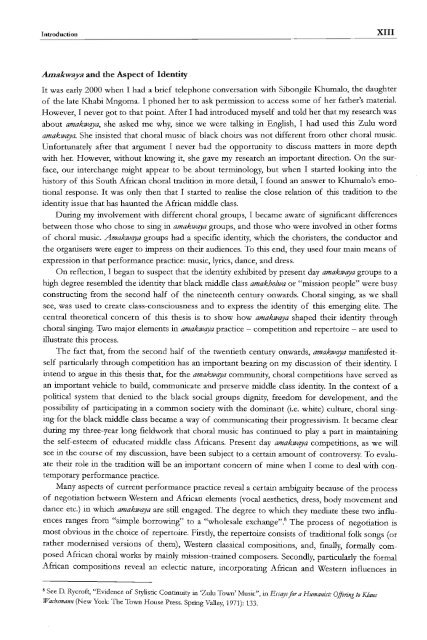South African Choral Music (Amakwaya): Song, Contest and the ...
South African Choral Music (Amakwaya): Song, Contest and the ...
South African Choral Music (Amakwaya): Song, Contest and the ...
Create successful ePaper yourself
Turn your PDF publications into a flip-book with our unique Google optimized e-Paper software.
Introduction<br />
<strong>Amakwaya</strong> <strong>and</strong> <strong>the</strong> Aspect of Identity<br />
It was early 2000 when I had a brief telephone conversation with Sibongile Khumalo, <strong>the</strong> daughter<br />
of <strong>the</strong> late Khabi Mngoma. I phoned her to ask permission to access some of her fa<strong>the</strong>r's material.<br />
However, I never got to that point. After I had introduced myself <strong>and</strong> told her that my research was<br />
about amakwqya, she asked me why, since we were talking in English, I had used this Zulu word<br />
amakwqya. She insisted that choral music of black choirs was not different from o<strong>the</strong>r choral music.<br />
Unfortunately after that argument I never had <strong>the</strong> opportunity to discuss matters in more depth<br />
with her. However, without knowing it, she gave my research an important direction. On <strong>the</strong> surface,<br />
our interchange might appear to be about terminology, but when I started looking into <strong>the</strong><br />
history of this <strong>South</strong> <strong>African</strong> choral tradition in more detail, I found an answer to Khumalo's emotional<br />
response. It was only <strong>the</strong>n that I started to realise <strong>the</strong> close relation of this tradition to <strong>the</strong><br />
identity issue that has haunted <strong>the</strong> <strong>African</strong> middle class.<br />
During my involvement with different choral groups, I became aware of significant differences<br />
between those who chose to sing in amakwqya groups, <strong>and</strong> those who were involved in o<strong>the</strong>r forms<br />
of choral music. Amakwqya groups had a specific identity, which <strong>the</strong> choristers, <strong>the</strong> conductor <strong>and</strong><br />
<strong>the</strong> organisers were eager to impress on <strong>the</strong>ir audiences. To this end, <strong>the</strong>y used four main means of<br />
expression in that performance practice: music, lyrics, dance, <strong>and</strong> dress.<br />
On reflection, I began to suspect that <strong>the</strong> identity exhibited by present day amakwqya groups to a<br />
high degree resembled <strong>the</strong> identity that black middle class amakholwa or "mission people" were busy<br />
constructing from <strong>the</strong> second half of <strong>the</strong> nineteenth century onwards. <strong>Choral</strong> singing, as we shall<br />
see, was used to create class-consciousness <strong>and</strong> to express <strong>the</strong> identity of this emerging elite. The<br />
central <strong>the</strong>oretical concern of this <strong>the</strong>sis is to show how amakwqya shaped <strong>the</strong>ir identity through<br />
choral singing. Two major elements in amakwqya practice - competition <strong>and</strong> repertoire - are used to<br />
illustrate this process.<br />
The fact that, from <strong>the</strong> second half of <strong>the</strong> twentieth century onwards, amakwqya manifested itself<br />
particularly through competition has an important bearing on my discussion of <strong>the</strong>ir identity. I<br />
intend to argue in this <strong>the</strong>sis that, for <strong>the</strong> amakwqya community, choral competitions have served as<br />
an important vehicle to build, communicate <strong>and</strong> preserve middle class identity. In <strong>the</strong> context of a<br />
political system that denied to <strong>the</strong> black social groups dignity, freedom for development, <strong>and</strong> <strong>the</strong><br />
possibility of participating in a common society with <strong>the</strong> dominant (i.e. white) culture, choral singing<br />
for <strong>the</strong> black middle class became a way of communicating <strong>the</strong>ir progressivism. It became clear<br />
during my three-year long fieldwork that choral music has continued to play a part in maintaining<br />
<strong>the</strong> self-esteem of educated middle class <strong>African</strong>s. Present day amakwqya competitions, as we will<br />
see in <strong>the</strong> course of my discussion, have been subject to a certain amount of controversy. To evaluate<br />
<strong>the</strong>ir role in <strong>the</strong> tradition will be an important concern of mine when I come to deal with contemporary<br />
performance practice.<br />
Many aspects of current performance practice reveal a certain ambiguity because of <strong>the</strong> process<br />
of negotiation between Western <strong>and</strong> <strong>African</strong> elements (vocal aes<strong>the</strong>tics, dress, body movement <strong>and</strong><br />
dance etc.) in which amakwqya are still engaged. The degree to which <strong>the</strong>y mediate <strong>the</strong>se two influences<br />
ranges from "simple borrowing" to a "wholesale exchange".8 The process of negotiation is<br />
most obvious in <strong>the</strong> choice of repertoire. Firstly, <strong>the</strong> repertoire consists of traditional folk songs (or<br />
ra<strong>the</strong>r modernised versions of <strong>the</strong>m), Western classical compositions, <strong>and</strong>, finally, formally composed<br />
<strong>African</strong> choral works by mainly mission-trained composers. Secondly, particularly <strong>the</strong> formal<br />
<strong>African</strong> compositions reveal an eclectic nature, incorporating <strong>African</strong> <strong>and</strong> Western influences in<br />
8 See D. Rycroft, "Evidence of Stylistic Continuity in 'Zulu Town' <strong>Music</strong>", in Ess'!Ysfor a Humanist: Offering to Klaus<br />
Wachsmann (New York: The Town House Press. Spring Valley, 1971): 133.<br />
XIII

















